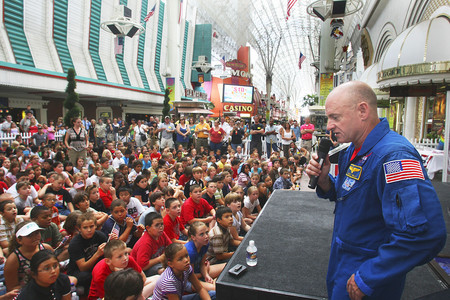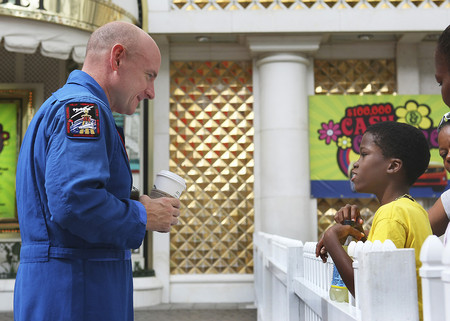Astronaut tells kids about space
Has anyone ever walked on Mars?
Have you ever reached Pluto?
Have you ever been up close to a star?
Hundreds of elementary students in the Clark County School District had a chance to meet NASA astronaut Scott J. Kelly this week, and they did not miss their chance to ask just how far from Earth he has been.
Kelly, who has flown two space shuttle missions and is scheduled to fly again in 2010, spoke to the students and fielded their questions about space during two presentations at the Fremont Street Experience.
The students, mostly fifth- and sixth-graders, raised their hands and waved flags to greet Kelly, and all morning continued raising their hands to ask questions.
They inquired about aliens (which Kelly has seen only on TV), space food (which is often dehydrated), and, of course, how many celestial bodies Kelly has visited (none).
As for approaching the stars, Kelly said he's been about as close to the sun as the typical Earth-dweller.
What about Pluto? Kelly said he's never been there, but an unmanned NASA spacecraft, New Horizons, is scheduled to fly by in 2015.
And Mars? Well, mankind has yet to set foot there. But Kelly told the students they might be the first to the Red Planet.
"Maybe one of you guys will get to do that," Kelly said. "Someone will someday."
He estimated it might be 20 to 30 years before a mission to Mars occurs.
"You guys would be about 40, which would be the perfect age," Kelly said.
Kelly, 45, has been with NASA since 1996. Previously a test pilot for the Navy, he made his first space flight in 1999. He piloted the space shuttle Discovery on a mission to upgrade the Hubble Space Telescope.
Kelly flew again in 2007, when he served as commander of the space shuttle Endeavour on a trip to the International Space Station.
He is preparing for another voyage to the space station in late 2010, this time in a Russian Soyuz spacecraft.
The Soyuz will take off during a transitional period for NASA, which is phasing out its three space shuttles. Once Endeavour returns from its current mission at the space station, only seven missions will remain for the aging shuttle fleet. Then NASA's new Constellation program will move to the forefront of U.S. space travel.
In an interview before Tuesday's presentations, Kelly said the shuttle program has been incredible.
"In our lifetime we won't have a spacecraft that is as versatile," Kelly said. "But if our goal is to return to the moon and go on to Mars, you can't do that in a space shuttle."
The new Constellation program, including the Ares rockets, Altair lunar lander and Orion spacecraft, aims to meet that goal: to take humans back to the moon and eventually to Mars.
With the 40th anniversary of the Apollo 11 landing this week, several Apollo astronauts have made headlines by calling for stronger efforts to reach Mars.
Kelly, too, spoke of ambitions to reach the Red Planet.
"I think it's our destiny to keep expanding our boundary, and the next place we could go is Mars," Kelly said. "We could get there in a few years if we wanted to spend the money."
But Kelly said the United States must find a balance in spending.
"There are a lot of priorities in this country," he said. "We don't have unlimited funds."
"But if we did" have the money to get to Mars, Kelly said, "we could."
Contact reporter Dan Everson at 702-383-0245.
Video


















